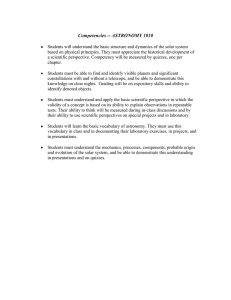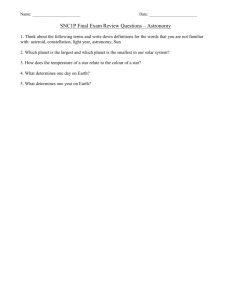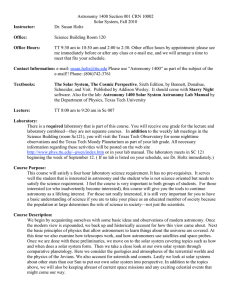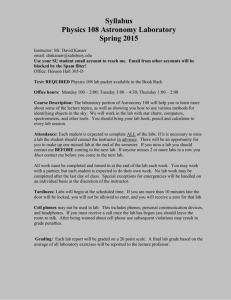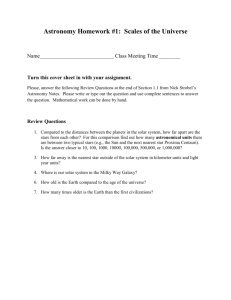Astronomy 1400 Section 002 CRN 33731 Solar System, Spring 2011
advertisement
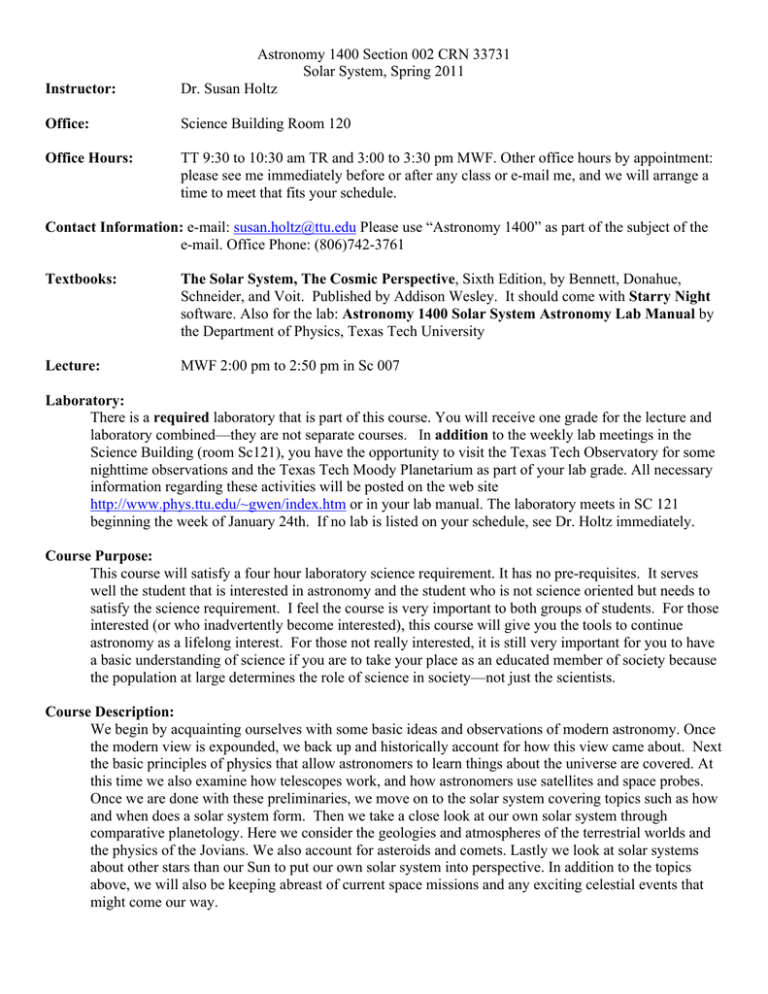
Instructor: Astronomy 1400 Section 002 CRN 33731 Solar System, Spring 2011 Dr. Susan Holtz Office: Science Building Room 120 Office Hours: TT 9:30 to 10:30 am TR and 3:00 to 3:30 pm MWF. Other office hours by appointment: please see me immediately before or after any class or e-mail me, and we will arrange a time to meet that fits your schedule. Contact Information: e-mail: susan.holtz@ttu.edu Please use “Astronomy 1400” as part of the subject of the e-mail. Office Phone: (806)742-3761 Textbooks: The Solar System, The Cosmic Perspective, Sixth Edition, by Bennett, Donahue, Schneider, and Voit. Published by Addison Wesley. It should come with Starry Night software. Also for the lab: Astronomy 1400 Solar System Astronomy Lab Manual by the Department of Physics, Texas Tech University Lecture: MWF 2:00 pm to 2:50 pm in Sc 007 Laboratory: There is a required laboratory that is part of this course. You will receive one grade for the lecture and laboratory combined—they are not separate courses. In addition to the weekly lab meetings in the Science Building (room Sc121), you have the opportunity to visit the Texas Tech Observatory for some nighttime observations and the Texas Tech Moody Planetarium as part of your lab grade. All necessary information regarding these activities will be posted on the web site http://www.phys.ttu.edu/~gwen/index.htm or in your lab manual. The laboratory meets in SC 121 beginning the week of January 24th. If no lab is listed on your schedule, see Dr. Holtz immediately. Course Purpose: This course will satisfy a four hour laboratory science requirement. It has no pre-requisites. It serves well the student that is interested in astronomy and the student who is not science oriented but needs to satisfy the science requirement. I feel the course is very important to both groups of students. For those interested (or who inadvertently become interested), this course will give you the tools to continue astronomy as a lifelong interest. For those not really interested, it is still very important for you to have a basic understanding of science if you are to take your place as an educated member of society because the population at large determines the role of science in society—not just the scientists. Course Description: We begin by acquainting ourselves with some basic ideas and observations of modern astronomy. Once the modern view is expounded, we back up and historically account for how this view came about. Next the basic principles of physics that allow astronomers to learn things about the universe are covered. At this time we also examine how telescopes work, and how astronomers use satellites and space probes. Once we are done with these preliminaries, we move on to the solar system covering topics such as how and when does a solar system form. Then we take a close look at our own solar system through comparative planetology. Here we consider the geologies and atmospheres of the terrestrial worlds and the physics of the Jovians. We also account for asteroids and comets. Lastly we look at solar systems about other stars than our Sun to put our own solar system into perspective. In addition to the topics above, we will also be keeping abreast of current space missions and any exciting celestial events that might come our way. Expected Learning Outcomes: Upon completion of this course, students will: 1. Understand the motions of celestial objects (Sun, Moon, Stars, Comets, Planets, and Asteroids) in the sky 2. Understand astronomy basics (For example: What is the ecliptic? Celestial equator? Equinox? Solstice? When do eclipses occur? …) 3. Know the history of astronomy. 4. Understand the physics of astronomy at an elementary level and know how astronomers use it to learn about the universe. 5. Understand how telescopes work. 6. Understand the physical principles involved in the formation and maintaining of planetary atmospheres. 7. Understand the physical principles involved in the geology of the terrestrial worlds. 8. Understand why the Jovians formed as they did 9. Understand how a solar system forms 10. Study the nature and detection of extrasolar planets 11. Have the tools needed to continuing enjoying astronomy on their own as a hobby if desired. By enjoying I mean that the motivated student will be able to use a simple telescope to make observations of and identify celestial objects. Methods for Assessing the Expected Learning Outcomes: Exams, Class Discussions, Classroom Assessment Techniques, and Polling the class. Determining your course grade: • There are 55 possible points for the laboratory part of your grade. They are distributed as follows: 9 labs in Sc 121 at your scheduled lab time that are worth 3 or 4 points each depending on the difficulty of the lab, three outdoor nighttime observing labs that are worth 5 points each, one lab at Texas Tech Moody planetarium that is worth 4 points, and one take home lab that is worth 6 points. • There are 60 possible points for the lecture part of your grade. In the lecture there will be three tests. Of these three test grades, the two highest will each be worth 20 points. There will be no make-up for missed tests after one day from the time the test is given. If possible please let me know early if you are going to miss a test since there is a possibility that you may take the test in advance. Also there will be a final exam that is worth 20 points. The final exam is required and cannot be dropped. The questions on the three tests and final will be taken from material covered in class, from assigned reading in the text, and from assigned work outside of class. • To calculate how many points that you earn for each task, multiply the grade you got for that task divided by 100 times the number of points that the task is worth. For instance, if your grade on test 1 was a 95, you earned 0.95 times 20 which is 19 points for that test. • Your final course grade is the sum of the points earned in lab and in the lecture. Notice that if you add the points possible in the lab to those possible in the lecture, the sum is 115 points. 100 points is a perfect score in Astronomy 1400. Thus the extra 15 points serves as a cushion in case you are unable to attend a lab for any reason or if one of your labs is cancelled due to reasons beyond our control such as weather. There are no make up labs for the labs scheduled in Sc 121, however if you miss your lab try to attend the missed lab in a different section. In the case of the outdoor observing labs, if a lab is cancelled due to weather or road conditions, we will do our best to reschedule a make-up lab. However at times we can not schedule a make-up lab or you may not be able to attend the make-up at the time it is scheduled. The 15 extra points serves as a cushion for this reason as well. If you are able to attend all labs and have no rainouts, any of the cushion 15 points you earn are extra credit in your course grade! Tentative Test Dates for the lecture: February 14th, March 23rd, April 22nd Final exam date: Monday May 9th at 4:30 pm to 7 pm (place to be announced in class). Grading Scale based on point earned: Above 100 points= A+, 90-100= A; 80-89.9=B; 70-79.9=C, 60-69.9=D, Below 60=F Attendance to the lecture portion of Astronomy 1400: Attendance will be taken but will not affect your grade in the lecture portion of the class. A spirit of honesty will be maintained in the attendance policy: if the number of people in the class does not equal the number of people checked off on the attendance sheet, no curve will be issued if the class as a whole performs poorly on a test. Note you are responsible for everything that we do in class, so it is to your advantage to attend. (For the lab portion of your grade, attending the lab is the only way to get credit.) A Class Policy for Astronomy 1400: Earth Creatures Beware… • Reading newspapers or unrelated material, texting or talking on your cell, visiting with your neighbor, and irrelevant activities are not allowed in this class because it distracts your teacher and the other students. Do these things and you will be asked to leave the class. • NO LAPTOPS or any other electronic devices are allowed in class unless need for such device for reason of a disability is documented by AcessTECH. • If you have an emergency situation that requires you to take a cell phone call or text during class leave the room to take the call or text and return when you are finished. Standard Texas Tech Policies that apply to all of your classes: • Any student who, because of a disability, may require special arrangements in order to meet the course requirements should contact the instructor as soon as possible to make any necessary arrangements. Students should present appropriate verification from Student Disability Services during the instructor’s office hours. Please note: instructors are not allowed to provide classroom accommodations to a student until appropriate verification from Student Disability Services has been provided. For additional information, please contact Student Disability Services in West Hall or call 806-742-2405. • Students will foster a spirit of academic integrity, and they will not present work as their own that was not honestly preformed by them. A few helpful or fun web sites in astronomy: Astronomy 1400 LAB web site (always “refresh” or “reload” to see the most current information posted): http://www.phys.ttu.edu/~gwen/index.htm NASA picture of the day: http://antwrp.gsfc.nasa.gov/apod/ Download a free sidereal clock: http://www.radiosky.com/sidclockdownload.html NASA: check out all past current and future missions by the USA in space: http://www.jpl.nasa.gov/ Tentative Course Outline for the Lecture: Important Note: This will be your reading assignment unless otherwise changed in class. This schedule may change! Date: week of January 10th January 17th January 24th January 31st Topics to be covered* Course Syllabus, Chapter 1 Chapter 1and 2 Chapter 2 and 3 Chapter 3 February 7th February 14th February 21st February 28th March 7th March 14th March 21st March 28th April 4th April 11th April 18th April 25th Chapter S1 Chapter 4 Chapter 5 Chapter 6 Chapter 7 Spring Break Chapter 8 Chapter 9 Chapter 10 Chapter 11 Chapter 12 Chapter 13 May 2nd Final Chapter 13 • Important Dates Holiday Jan 17th Labs Begin in Sc 121 Register for outdoor labs by Feb 2nd. Outdoor labs begin. Test 1 Feb 14th Planetarium Labs this week Spring Break Test 2 March 23rd Take Home Lab due Test 3 April 22nd Holiday April 25th Final exam May 9th 4:30 pm This is only a partial list relating to the reading assignments in the text book. Added to the topics in the text will be current mission news from NASA, current events in the night sky such as possible meteor showers, eclipses, and interesting oppositions, and current locations of the Moon, planets and other objects of interest. Other topics may be included as the need arises. Test material will cover the Text assignments listed above as well as the additional material covered in class. Hope you enjoy the course!

